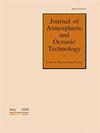Bayesian Classification of Non-Meteorological Targets in Polarimetric Doppler Radar Measurements
IF 1.9
4区 地球科学
Q2 ENGINEERING, OCEAN
引用次数: 1
Abstract
ABSTRACT: The latest established generation of weather radars provides polarimetric measurements of a wide variety of meteorological and non-meteorological targets. While the classification of different precipitation types based on polarimetric data has been studied extensively, non-meteorological targets have garnered relatively less attention beyond an effort to detect them for removal from meteorological products. In this paper we present a supervised learning classification system developed in the Finnish Meteorological Institute (FMI) that uses Bayesian inference with empirical probability density distributions to assign individual range gate samples into 7 meteorological and 12 non-meteorological classes, belonging to five top level categories of hydrometeors, terrain, zoogenic, anthropogenic, and immaterial. We demonstrate how the accuracy of the class probability estimates provided by a basic Naive Bayes classifier can be further improved by introducing synthetic channels created through limited neighborhood filtering, by properly managing partial moment nonresponse, and by considering spatial correlation of class membership of adjacent range gates. The choice of Bayesian classification provides well-substantiated quality estimates for all meteorological products, a feature that is being increasingly requested by users of weather radar products. The availability of comprehensive, fine-grained classification of non-meteorological targets also enables a large array of emerging applications, utilizing non-precipitation echo types and demonstrating the need to move from a single, universal quality metric of radar observations to one that depends on the application, the measured target type, and on the specificity of the customers’ requirements.极化多普勒雷达测量中非气象目标的贝叶斯分类
摘要:最新一代气象雷达提供了对各种气象和非气象目标的极化测量。虽然基于极化数据对不同降水类型的分类已经进行了广泛的研究,但除了努力从气象产品中发现非气象目标之外,对它们的关注相对较少。在本文中,我们提出了一个由芬兰气象研究所(FMI)开发的监督学习分类系统,该系统使用贝叶斯推理和经验概率密度分布将单个范围门样本划分为7个气象类和12个非气象类,属于水成物、地形、动物、人为和非物质的5个顶级类别。我们演示了如何通过引入通过有限邻域滤波创建的合成通道,通过适当管理部分矩非响应,以及通过考虑相邻范围门的类隶属度的空间相关性,进一步提高基本朴素贝叶斯分类器提供的类概率估计的准确性。贝叶斯分类的选择为所有气象产品提供了充分证实的质量估计,这是气象雷达产品用户越来越多地要求的特性。非气象目标的全面、细粒度分类的可用性也使大量新兴应用成为可能,利用非降水回波类型,并表明需要从单一的、通用的雷达观测质量度量转变为依赖于应用、测量目标类型和客户需求特异性的质量度量。
本文章由计算机程序翻译,如有差异,请以英文原文为准。
求助全文
约1分钟内获得全文
求助全文
来源期刊
CiteScore
4.50
自引率
9.10%
发文量
135
审稿时长
3 months
期刊介绍:
The Journal of Atmospheric and Oceanic Technology (JTECH) publishes research describing instrumentation and methods used in atmospheric and oceanic research, including remote sensing instruments; measurements, validation, and data analysis techniques from satellites, aircraft, balloons, and surface-based platforms; in situ instruments, measurements, and methods for data acquisition, analysis, and interpretation and assimilation in numerical models; and information systems and algorithms.

 求助内容:
求助内容: 应助结果提醒方式:
应助结果提醒方式:


